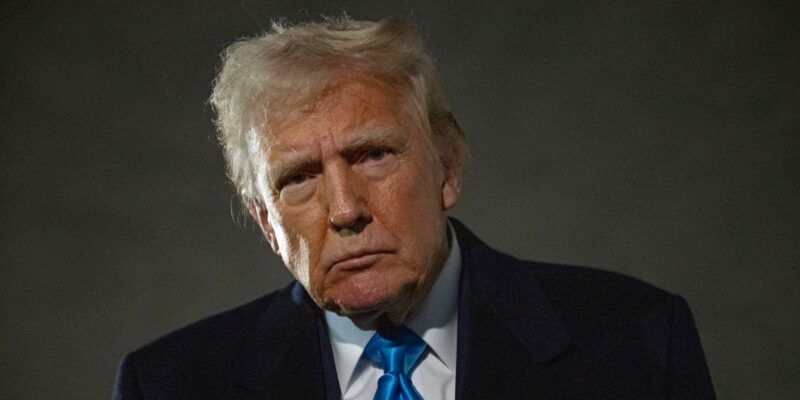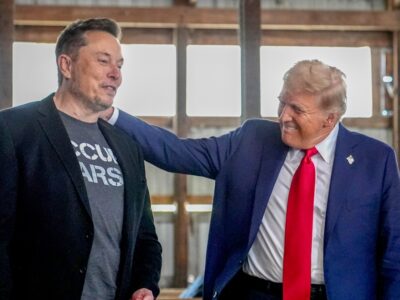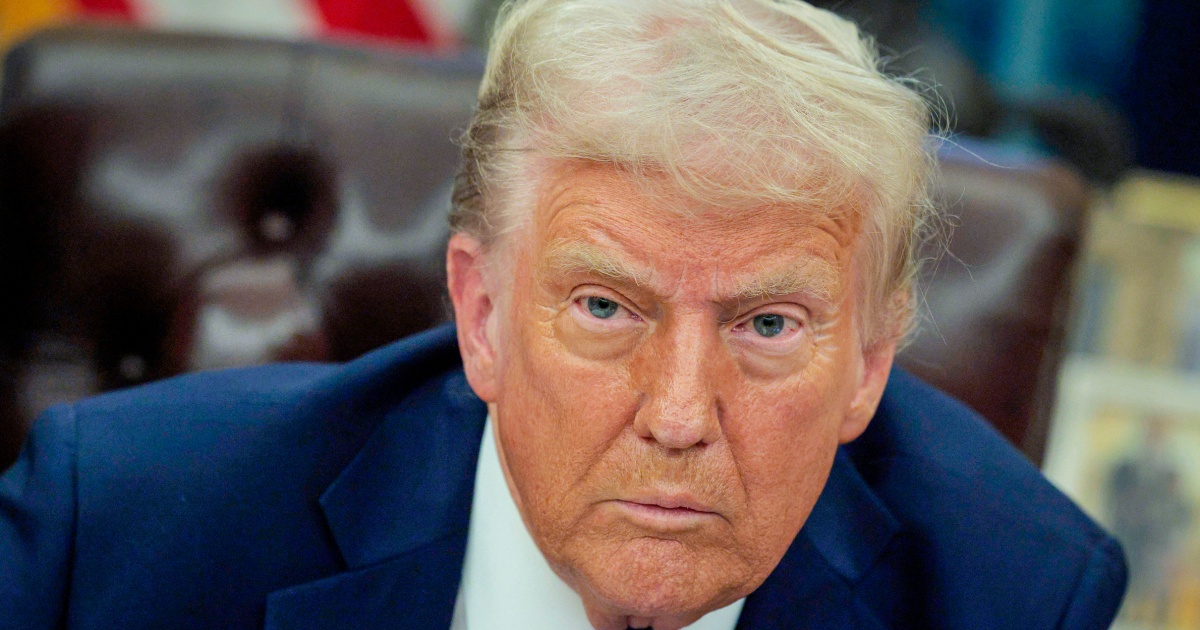
The impacts of Donald Trump’s long-promised pledge to use tariffs as a political cudgel started to come into focus Monday, even as the president cut last-minute deals with some of the nation’s closest allies allowing him to back down from his initial threats.
On Sunday, Trump announced that he would be slapping broad 25% tariffs on Canada and Mexico, both U.S. allies, and 10% tariffs on China, a political foe. The move was expected, but it still sparked fears about the rising costs of goods across the U.S. economy.
That concern is particularly potent because Trump campaigned heavily on lowering costs and easing inflation. If fully implemented, Trump’s tariff proposals would impact American households’ purchasing power by between $1,000 and $1,200 annually, according to the Budget Lab at Yale University.
The first domino to fall came early Monday when Mexican President Claudia Sheinbaum announced a deal had been reached to delay tariffs on her country by one month, in return for Mexico agreeing to beef up its presence at the border with the U.S. with 10,000 members of its National Guard.
It was effort to placate the Trump administration, which at times has been inconsistent with its messaging about the rationale for tariffs, but has consistently said curbing the flow of drug trafficking into the U.S. is a main focus.
Trump officials quickly took a victory lap after the announcement, even as several steps to avoiding a potential heated trade war remain.
“So for literally three days, I heard the far left in this country say that these tariffs would make Americans’ life worse,” Vice President JD Vance said during an event in Ohio in response to a question from NBC News. “And what actually happened is the Mexican government was so afraid of the tariffs that they actually are taking their border enforcement and their anti-cartel activity more seriously.”
“That is not a pathway to making Americans worse off,” he added. “That’s a pathway to making Americans better off.”
Trump posted on Truth Social that he had a “very friendly conversation” with Sheinbaum, a quick shift in tone. Over the weekend, she rejected what she called “slander” from Trump for suggesting her government had an alliance with drug traffickers.
The past few days have shown one thing: Trump’s tariff threats were not necessarily hollow campaign rhetoric.
“One thing that is different is that leaders need to realize that Trump is serious,” Heritage Foundation research fellow EJ Antoni said. “If they just think it’s all bluster or campaign promises, nothing will really change, right? They have to know he is serious.”
Antoni predicted continued “de-escalation” as Trump’s threats start to be interpreted as real, due to the size of the U.S. economy and the disproportionate trade relationship with Canada and Mexico. The two allies are America’s largest trading partners, but international trade accounts for a much larger percentage those countries’ overall economies.
“He economically holds all the cards” he said. “He has now made clear this is serious and happening. You can either get on the train, get off the tracks, or get run over.”
There has, at times, been inconsistent rhetoric coming from the Trump administration about the motivation for tariffs. Trump economic adviser Peter Navarro told reporters in Washington Monday that the fight is not a trade war but “a drug war,” echoing comments of other advisers.
Trump himself, though, has repeatedly said he is concerned the targets of the tariffs bully the U.S., and that the tariffs can be a weapon to end that perceived mistreatment.
For example, hours after the Mexico deal was announced, Trump continued to antagonize Canada, claiming the only thing the nation could do to avoid tariffs is become the 51st state — something Canada has repeatedly said it would not do.
“What I’d like to see…Canada become our 51st state,” Trump said in an Oval Office meeting with reporters when asked what Canada could do to end the pending trade war. “We give them protection, military protection, we don’t need them to build our cars, I’d rather see Detroit, or South Carolina…or any one of our states build the cars.”
Trump’s comments came shortly before he was scheduled to have his second call of the day with outgoing Canadian Prime Minster Justin Trudeau. Unlike Mexico, little fentanyl comes across the U.S.-Canadian border. Trudeau told reporters Saturday night that it’s less than 1% of all the supply in the U.S.
A 30-day delay on tariffs was announced with Canada Monday afternoon after that second call. Trudeau said he had a “good call with President Trump,” who has used him as a political bogeyman for months. As part of the deal, Trudeau said the country would spend $1.3 million billion on border security plan and appoint a “fentanyl czar.”
The border security funding portion of the plan was first proposed by the Canadian government in 2024.
A spokeswoman for the Canadian government did not return a request seeking comment about whether the already proposed plan was used as part of the deal cut with Trump.
The White House did not return a request seeking comment.
For now, most congressional Republicans have not commented publicly on whether they support Trump’s push for tariffs on historic political and economic allies, with a few exceptions. Sen. Chuck Grassley, R-Iowa, was the first to chime in on Monday morning when he took to X to “plead” with Trump to consider tariff’s impacts on his agriculture-heavy state.
“Biden inflation increase the input cost to farming by 20% incl particularly high prices on fertilizer,” Grassley posted. “So I plead w President Trump to exempt potash from the tariff because family farmers get most of our potash from Canada.”
Sen. Ron Johnson, R-Wis., also told Newsmax that he shares “the market’s concern” about long-term tariffs.
“It’s going to hurt Americans, American companies, American exporters, it will hurt American consumers long term,” he said.
While Trump brokered 30-day reprieves with Canada and Mexico, it’s unclear how the tariff fight will end with those nations, and the threats against China — by far the largest economy of the three — on Monday were not resolved.
China has said it will challenge the tariffs at the World Trade Organization and pursue “countermeasures” in response.
There is little indication that Republican senators will start to speak out in large numbers against Trump’s threats of trade wars, even if there is a prolonged fight on the issue.
“There might be a few,” a political adviser to Senate Majority Leader John Thune, R-S.D., said. “But generally, I think there is a sense that Trump holds all the cards here. To the extent there is concern about home state constituencies, I think a lot of that will be expressed quietly and behind the scenes.”
Another veteran Republican familiar with Thune’s thinking said he is unlikely to react in any overtly public, or rash, way.
“These are U.S. senators. They have egos like everyone else,” the person said. “Sen. Thune approaches things differently. He is more of a read-the-room guy. I’d not expect him to act impulsively on anything, including this.”
The impacts of potential tariffs, for now, have been averted, but the future remains unclear, which leaves uncertainty both in the U.S. and across the globe. U.S. markets fell early Monday, but hey quickly rebounded after the one-month Mexico pause was announced.
Though Trump ran on the promise that tariffs would be good for the nation, in recent days, he has begun to acknowledge that if fully implemented there would be some short-term pain. But he is now arguing that those bumps and bruises would be beneficial to the nation in the long run.
“Will there be some pain? Yes, maybe (and maybe not!),” Trump posted on Truth Social. “But we will make America great again, and it will all be worth the price that must be paid. We are a country that is now being run with common sense — and the results will be spectacular!!!”















